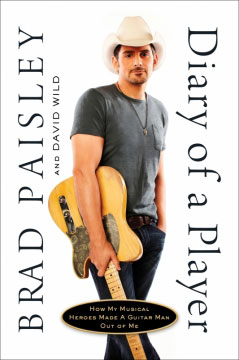
 Building an artistic career takes time. Building an artistic career that lasts more than 15 minutes takes even more time: hours of practicing, planning, rehearsing, and preparing for what to do when your moment arrives.
Building an artistic career takes time. Building an artistic career that lasts more than 15 minutes takes even more time: hours of practicing, planning, rehearsing, and preparing for what to do when your moment arrives.
It’s a lesson Brad Paisley understands well and shares in his first book, Diary of a Player (written with David Wild). The book is part thank you to Paisley’s mentors, like his grandfather Warren Jarvis who gave the artist his first guitar and his guitar teacher Clarence “Hank” Goddard, as well as fellow artists like Steve Wariner, Buck Owens, Vince Gill and more. It’s also a document of Paisley’s journey from nascent eight-year-old musician to world class axeman and superstar entertainer, and shows him to be an incredibly decent person with an abiding love for country music and his guitar.
As a model for artistic success, Paisley’s got a remarkably sturdy foundation. Not that there’s a one-size fits all approach to becoming a superstar, but you’d be doing well to fold at least a few of the following Paisley approaches into your recipe for success:
Work hard to be excellent. That probably goes without saying. Paisley’s dazzling guitar chops were forged over years of practice, lessons, and jam sessions. He’s a monster player, but says he was never a prodigy.
“Some of you out there may have been blessed with the good fortune of being born great at something, but most of us mere mortals still have to get good first, and that process usually takes a little time. I think it was years before I was doing anything you’d call ‘great.’”
Wait your turn, and learn everything you can in the meantime. Don’t expect a publishing/recording/management deal as soon as you arrive in town, and don’t sign your life away on one at the first opportunity.
“First of all, I didn’t rush into any kind of bad deals right away as people tend to do when they’re starting out. Second, thanks to all of those connections I made during my time at Belmont, I suddenly began to feel some real interest from the Nashville music community. Since I had personally interned for a significant portion of that music community, I was pleasantly surprised to find out that some of those people liked me okay. I’m a great believer in watching and waiting your turn, and it’s worked out well for me.”
Make friends. Two of Paisley’s most important collaborators to date, producer Frank Rogers and songwriter Chris DuBois, were people he befriended through school and his internships.
“Chris DuBois was roughly my age, had just graduated, and got hired as a new membership rep at ASCAP about three months after I started my internship. Our similar sense of humor was obvious right away, and we really hit it off. When he found out I wrote songs, he wanted to hear them.”
“We chose Arista, and I believe we made the right choice. Arista proved that when I let them know that I wanted my Belmont collaborator Frank Rogers to produce my first album. They didn’t even flinch. Even though neither one of us had a lot of what you might call professional recording experience (as in absolutely none). But by now I had waited for my moment, and I knew the kind of album I wanted to make, and I believed in Frank and the guys I’d gathered around me.”
Know who you are as an artist. But understand that who you are may not be something a major record label knows how to market. Consider alternatives, such as The Civil Wars method. Make music because you want to make music, not because you want to be famous.
“To all the younger artists out there, here’s what I’ve learned: define yourself instead of allowing others to do that important job for you. Don’t let anybody paint you into a corner or tell you who you are. You tell them.”
And most importantly, stay humble and remember those who helped you along the way.
“…no matter who you are, or how big you get, you can’t forget where you came from. If Porter Wagoner can be nice to a fool like me backstage at the Opry, then who am I to be anything other than nice as well? This is a country tradition that other genres of music could learn from a little. Roy Acuff wasn’t a jerk, and Little Jimmy Dickens is may be the nicest guy in the world.”



